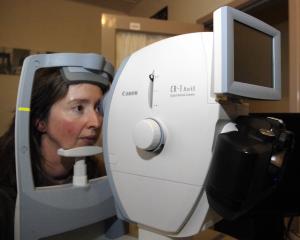The Otago District Health Board's highest-polling candidate at the last election, Judith Medlicott, says she will not be standing for the new Southern board this year, but eight board members are still making up their minds.
An Otago Daily Times survey of 18 of the 20 Southern board members showed more indecision among Otago members.
Mrs Medlicott, who has been on the board since 2001, is the only former Otago member to say categorically she is not standing again.
At 68 she was " physically tired", but had enjoyed her time with the health board, which was a "wonderful institution".
Unlike other boards in the country where all seven members are elected at large, under the new Southern board, three members will be elected from Southland and four from Otago.
A further four people will be appointed to the board by Health Minister Tony Ryall, including the chairperson and the deputy.
Current chairman Errol Millar, who has served on either the Otago or Southland board since 2002, said he would accept a reappointment.
His Southland deputy Paul Menzies, who is in his third term, having served both as an elected member and an appointed one, said he was "torn" over whether to stand, and it was too early to say.
Among those who have not reached a final decision is former Otago chairman Richard Thomson, who remains 99% sure he will not stand again.
Mr Thomson, who was controversially sacked as chairman by Health Minister Tony Ryall last year but was able to continue on the board because he was elected as well as appointed, said 10 years was a "pretty decent chunk of anyone's life" and his "current feeling is that it is time to find some new challenges".
Any change of heart would be out of loyalty to people in the board that he respected and a belief his experience could achieve something useful for people in the south in the new board.
Susie Johnstone, who was appointed deputy chairwoman of both previous boards and still heads the board's audit finance and risk committee, said she had not considered standing for election.
Her future as an appointed member would be up to the minister, but she thought having served the standard two terms (her first term as an Otago member), she would be unlikely to be reappointed.
However, if she were asked to do another term in the interests of continuity and consistency, she would be willing to do so.
Another two-term appointed member, Helen Algar, of Oamaru, is 90% sure she will not serve again and said it was time to let "fresh eyes" have an opportunity.
Peter Barron said he was considering whether he had " done his dash" after nine years as an elected member, but was also deciding whether he would be remaining in Dunedin or shifting elsewhere in the country or overseas.
A pharmacist, Mr Barron said he strongly believed the board needed people with a detailed knowledge of the health sector and the work to be done with the new board and the single primary health organisation was an attraction.
Balclutha GP Dr Branko Sijnja, elected to the board in 2004, said he had not completely made up his mind but would probably stand.
It was important members with experience stayed on to help the two boards successfully merge, he said.
Central Otago Mayor Malcolm Macpherson, completing his third term as an elected member, said, while he was undecided, it was likely he would stand.
A long-time supporter of the one board, which he considers will have great benefits for inland Otago, Dr Macpherson said if the new board was to work effectively, there was a need for "institutional memory" and experience and understanding of the organisation.
Louise Rosson, who has served in Otago since 1998 as an elected or appointed member, is undecided.
A common theme among those who had indicated they would stand again or were hopeful for another appointment was the need to see through the changes begun in this board term.
Discussing their reasons for standing again, first-time elected members Louise Carr (Otago) and Kaye Crowther (Southland) both referred to the importance of ensuring the community voice was heard.
Tim Ward, appointed to the Southland board last year, said he would not stand for election but was willing to serve as an appointee.
Another appointed Southland member, Karen Goffe, who has served about eight years, said she did not expect to be reappointed.
*Appointed members to the Otago and Southland boards effectively have a clean slate for future government appointments, because of the new board.
Ministry of Health governance and Crown entities manager David Pannett said appointed members of the Southland and the Otago boards could be appointed to the Southern District Health Board without their previous terms counting.
DHB board members can serve for up to nine consecutive years on a board, but written permission from the government minister is required after six years.











